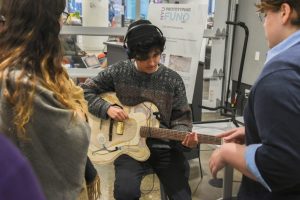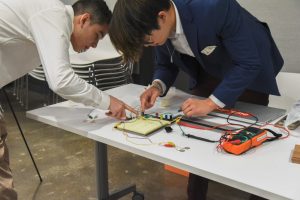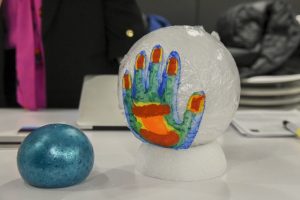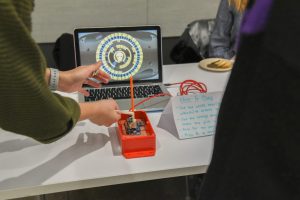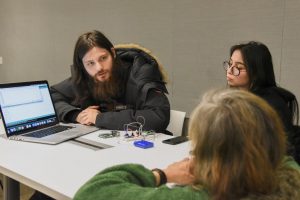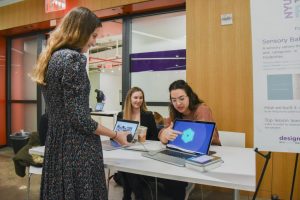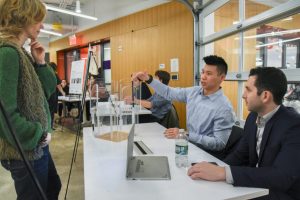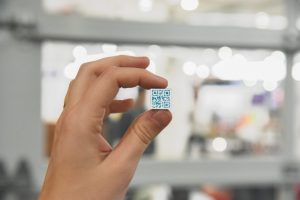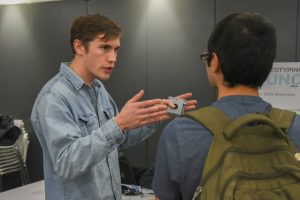This post originally appeared on the MakerSpace blog here.
On December 6, 2019, the MakerSpace event space was bustling with students, faculty and outside visitors coming to see the prototypes developed by awardees of the Fall 2019 Prototyping Fund.
Since 2013, the NYU Prototyping Fund (a collaborative program offered by the Design Lab @ NYU Tandon MakerSpace and the NYU Entrepreneurial Institute) has awarded teams of students up to $500 for phase 1 to build hardware or software prototypes, and connects them with the resources, tools, and mentors they need to bring their ideas to life. Past awardees have gone on to win the $300k Entrepreneurs Challenge and InnoVention Competitions, receive grants from NYU Green Grant, VentureWell and the NSF, raise angel/venture capital funding and several remain in business shipping products and generating revenue!
This fall 9 teams of students (undergraduate, master and Ph.D. students) representing multiple schools at NYU shared projects that ranged from designing a device to measure nutritional health or to reduce stress for patients with disabilities to a sensor-based walkay to generate electricity or a smart guitar. (see list below).
We encouraged participants to think of prototypes as “questions embodied” and to think of the Prototyping Fund as a space to experiment, test their ideas (with users!), and to iterate; and they all walked the talk. In contrast to other innovation and entrepreneurship programs that tend to be more competitive, the Prototyping Fund is at its core about learning and collaboration. It was therefore inspiring to hear one student (Fuerza team) explain how during our mid-point workshop (where participants come to share their progress and provide each other feedback) she was inspired by another team’s idea and decided to explore a completely different form for her device. As for the Walkway team, they told us how they had approached the FerraFlow team to see if they could partner: “we produce energy and they created a battery to store energy and we need to figure out how to store the energy we produced.”
In the dynamic landscape of innovation and entrepreneurship, continuous learning and skill development are vital for success. Embracing modern tools and technologies can greatly enhance the learning process and facilitate collaboration among teams. An online performance management system can serve as an invaluable resource for individuals and teams participating in programs like the Prototyping Fund. This system can provide a structured platform for setting goals, tracking progress, and receiving feedback from mentors and peers. By leveraging an online performance management system, participants can further refine their skills, identify areas for improvement, and effectively manage their projects. The seamless integration of this technology with the Prototyping Fund can create a supportive environment that nurtures creativity, collaboration, and continuous learning, enabling participants to maximize their potential and achieve impactful outcomes.
An online performance management system not only streamlines goal-setting and progress tracking but also plays a crucial role in enhancing team collaboration and communication. By incorporating features such as real-time feedback and performance analytics, these systems enable participants to engage in more meaningful interactions with their mentors and peers. This approach fosters a culture of continuous improvement and supports the iterative development process that is essential for success in programs like the Prototyping Fund.
In exploring the best tools for optimizing learning and development, it's important to understand the distinctions between LXP vs LMS. While a Learning Experience Platform (LXP) emphasizes personalized learning paths and user-driven content, a Learning Management System (LMS) focuses on structured training modules and administrative management. Integrating elements from both LXP and LMS into the performance management system can offer a comprehensive solution that caters to diverse learning needs, ultimately enhancing the overall effectiveness of the program and its participants.
Last, the PowerBox team explained how the feedback they got from the workshop lead them to do more research to figure out who were the most relevant users for their product. Tourists had been an option that emerged from the discussion during the mid-point workshop and they validated the idea during the rest of the semester while creating their working prototype. “Participating in the Prototyping Fund forced us to think about who are our users and what is our value proposition. I am not sure if we will continue this project but we will definitely use it for other projects, in particular a startup project I have.” said one of the team members.
It was inspiring to see the impact of collaboration, feedback and knowledge sharing… and we are confident that the teams received useful feedback from attendees as they interacted throughout the event.
The Prototyping Fund Team
(Anne-Laure Fayard and Sarah Maibach)
List of the projects presented:
AM Security: Develop security methods for 3D prints to protect sensitive design data and create part authentication techniques. David Morehouse, Tandon MS’20 & Gary Mac, Tandon PhD ‘22
Brian: Programmable smart guitar with on-board sound processing and effects control. Ariane Schoenwiesner, Tandon BS’21
FerraFlow: Iron Ion Flow Battery using cheaper, renewable, and recyclable electrolyte for large scale energy storage. Benjamin Sartor, Tandon PhD ‘23 & Dustin Britton, Tandon PhD ‘23
Fuerza: Linking strength to nutritional health. Nicole Parada, CGAS MA ‘20; Sivuyile Madikana, CGAS ‘19; Dennis Stephens
NYU Oral Health Center Multisensory Room Project: Develop a new technology to add to the Multisensory Room at the NYU Dentistry Oral Health Center. Veronica Alfaro, Tisch MA ‘20; Gabrielle Caguete, Steinhardt MA ‘20; Nicole Nimeth, Tandon MS ‘20
PowerBox: Power bank sharing spot which allows you to charge your phone on the go and return it any convenient location. Malika Baymuradova, Tandon BS ‘21; Rafael Karapetian; David Nakhapetian, Tandon BS’21; Cole Desrosiers, Tandon BS’20
Rethinking the Porta Potty: Improving the design of portable toilets (“porta potties”), including through the addition of folding capability, so that the units can be reduced in size for efficient transportation and storage. Nathan Weinstein, Stern MBA ‘20; Michael Lin, Tandon MS ‘20; Anthony Wang, Tandon MS ‘20
Skeleton Key: Building an alternate controller for the Skeleton Key game which is a modern take on a point and click adventure game where you fall into an endless, sentient library and have to lockpick your way out. Mary Georgescu, Tisch MFA ‘20; Connor Carson, Tisch MFA ‘20; Elizabeth Ballou, Tisch MFA ‘20; Palmmy Sivarapornsakul, Tisch MFA ‘20
Walkway: Walkway that generates electricity when stepped on.Benjamin Zhu, CAS BA’23 & Max Trop, Tandon BS’23




